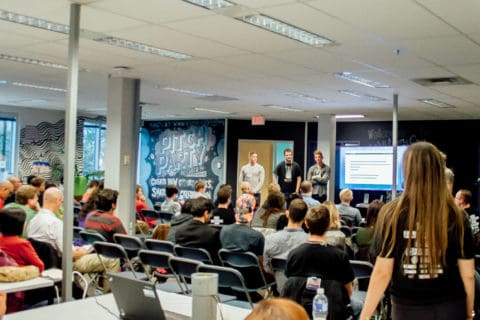The world of technology grows each day, offering new possibilities for advancement and human support. From Oct. 14–16, students at the University of Saskatchewan, along with healthcare, technology and business specialists, came together at a hackathon to solve some of the problems faced by the healthcare industry.
The hackathon, spanning 48 hours, is a competition in which teams brainstorm and build potential products to solve healthcare challenges. Organized by Med.Hack(+), a non-profit organization comprised mainly of students, this event began with healthcare professionals who pitched different problems in the healthcare system and explained how these problems might be solved using the help of technology.
Adam McInnes, graduate student in biomedical engineering, co-chair of Med.Hack(+) and organizer of the event, explained the main purpose of the organization.
“Our mission is to unite the inspiration of healthcare professionals with the ingenuity of creators to build solutions,” McInnes said.

Healthcare, technology and business students and professions compete for 48 hours to solve healthcare problems on Oct. 14-16.
Once healthcare professionals and students pitched their problem, technology students chose the problem that they wanted to solve and started working on the solution, either by writing computer programs or making 3D models. Students worked on many projects throughout the event, including a device that measures blood pressure using earphones, models of radiation therapy masks and the creation of a more organized Electronic Medical Records system.
McInnes explains his influences and why he wanted to organize an event like the hackathon.
“It all started back when I was in second year. One of the ideas that I had then, at that time, was finding a way to connect engineers and healthcare professionals … Since then, I’ve kind of looked into the One Health spectrum on the health of animals, health of humans, health of the environment. We’re all interconnected, we’re all very important.”
Kate Elliot, a second-year medical student who pitched her medical problem at the hackathon, believes that healthcare professionals benefited from the event because their ideas were judged, given feedback and improved on for better customer service.
“If it’s a good idea, people will want to join on and get excited about it and if it’s something that’s not feasible, you’re going to get that feedback,” Elliot said.
Elliot explains how she joined Med.Hack(+) and the hackathon this year, an event that she believes provides tools and resources for bringing innovative ideas and solutions to healthcare problems.
“I got involved with Med.Hack(+) through Technology Medicine, which is one of our student groups at the College of Medicine, and last year I helped with the registration and have been the board member of the club. This year I decided to take a bit more of a role and applied on the executive of it. There’s a lot of potential for these events,” Elliot said.
According to McInnes, Med.Hack(+) is hoping to improve the things that went less smoothly during the event. For example, he believes that a time limit on speeches and healthcare problem pitches and demos would make the event run more smoothly.
Kevin Lutzer, a second-year computer science student involved in a project at the hackathon, explains what he feels would have made the event more successful.
“I wish that Med.Hack(+) would have posted ideas beforehand so that we could look at it and contact the person [who pitched the idea], and from there on we could actually figure out what we’re going to need to do for the project.”
Ultimately, McInnes thinks that events like this one are good opportunity for students to get involved.
“Whether you’re on the planning committee, whether you’re making the stuff happen, whether you’re pitching an idea for teams to build, whether you’re on teams helping build stuff, you learn what you can do, you learn nothing is impossible. Sky’s the limit. Whatever you can imagine, you can do it. I think that’s the most valuable thing I’ve learned out of this and my team members have learned out of this.”
—
Tayab Soomro
Photo: Jeremy Britz / Photo Editor
Leave a Reply